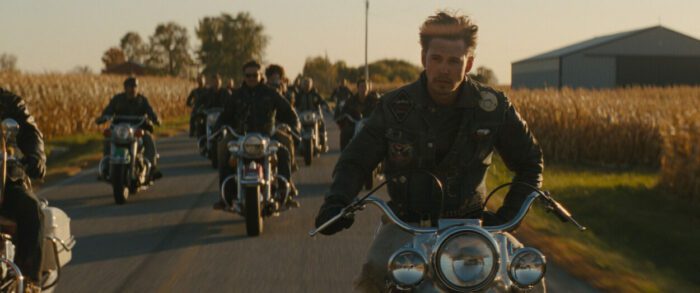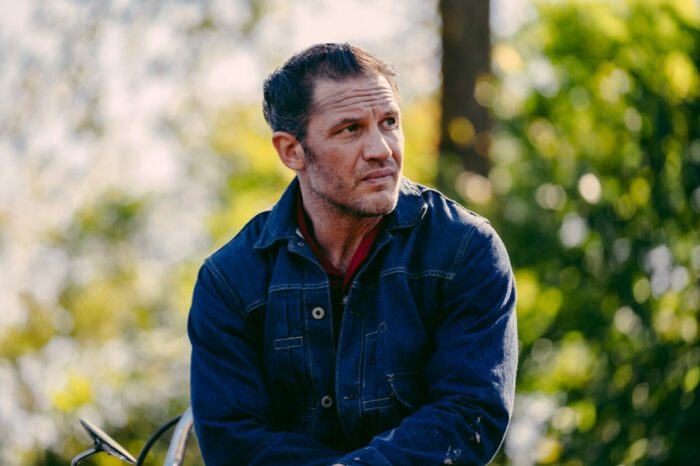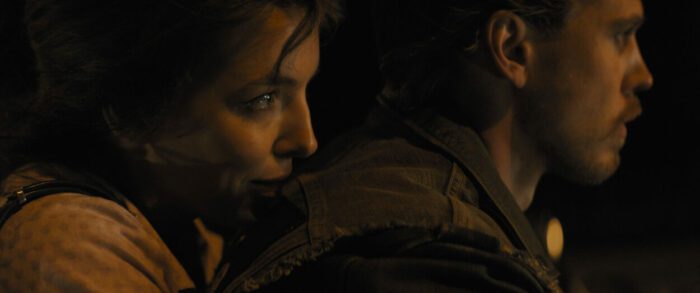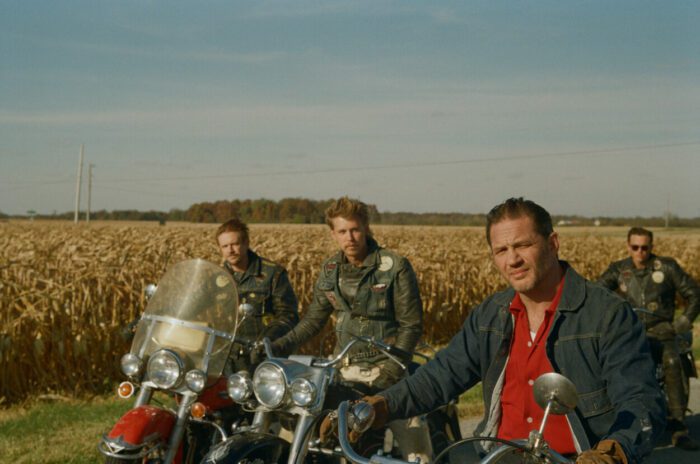Amid the ostentatious theatricality of actors making all kinds of noise in The Bikeriders, the other sound the film absolutely nails is the unmistakable deep bass rumble caused the asymmetrical arrangement of firing cylinders in Harley-Davidson engines. One by itself will get your attention. Five rolling together will rattle your windows. A dozen or more churning as a fleet becomes an aural maelstrom. Your selected reaction to that hellacious harmony will be your tinted gateway into Jeff Nichols’ petulant film, which made festival runs last fall before a strike delay until this summer.
As I see it, there are three defined reactions to that level of growling, fuel-injected rumble. You could be prudishly annoyed by it in a “knock off all that racket” kind of way begging for peace and quiet. Second, you could be scared by it, where the goosebumps and little hairs rise because of the sizable unknown menace getting closer. Or, you are downright drawn to it. To you, the sounds of those engines are a sensory trigger for freedom and as soothing as a lullaby to a baby. It goes without saying, the many crass and cantankerous characters of The Bikeriders fall into that emancipating third reaction.

To tell The Bikeriders based on Danny Lyon’s photography book of the same name, Jeff Nichols centered on two initially opposite vantage points that end up coiling together. The exposition dispenser of the film is Kathy, played by Jodie Comer of The Last Duel and Free Guy. She is being interviewed in 1965 and 1973 by a photojournalist named Danny (Challengers and West Side Story breakout Mike Faist) hoping to chronicle the inside story of the hey-day of the fictional Vandals Chicago motorcycle club. Kathy married into it and bore witness to the club’s tumultuous existence and rapid evolution.
On a fateful night meeting some girlfriends at a bar, a disinterested and perturbed Kathy had her gaze tempted and ultimately fixated on Benny, a stoic Vandals member played by dreamboat Elvis Oscar nominee Austin Butler. The film previously introduced his intoxicating mystique in Scorsese Lite freeze-frame fashion getting assaulted standing up to his own version of the old “these colors don’t run” ideal. The bond between the ingratiated, grounding nature of Kathy and the ultra-committed seriousness of Benny becomes the root of the film’s drama, all while the biker subculture flourishes under the no-nonsense command of Tom Hardy’s hulking Johnny.

Dating back to silver screen inspirations from Marlon Brando’s watershed 1953 film The Wild One (echoed and emulated here in the costume designs of Birds of Prey’s Erin Benach), the shared affinity for engines and belonging created motorcycle clubs across the country, decades before they would degrade and become synonymous with crime-committing gangs. With every greasy hand coming out of a sleeve of an exclusive member’s jacket adorned with badges and titles to swig cans of Schlitz or Blatz or throw hands at opponents, these men carried themselves with camaraderie underneath a streak of anti-establishment behavior. The Bikeriders platforms those original tenets with a glimmer of hero worship while also addressing their problematic flaws.
With that divide in mind, the motorcycle club subculture of The Bikeriders also swings a pendulum of rules for rulebreakers. On one level, unbridled personalities stirred men of “undesirable character” to defy laws for thrills, and not just the basic traffic ones. They found protective power as a rebel or group of strength. Yet, within their collective, there was an odd patience for unwritten laws of moral codes for immoral people all over the place. In the film, these are dictated by Johnny, right down to the “knives or fists” preference of challenging him for group leadership. What began as a tinkering club of common interests and motorcycle racing became a corrupt nest of inherent danger, where respect equaled fear.

Through a mercurial path of remembered episodes and key confrontations shot in and around the Cincinnati, Ohio area doubling as fringes of Chicago and flaunting that very danger for Johnny, Benny, and their tight-knit Vandals crew (an ensemble which includes professional movie villain Boyd Holbrook, Brooklyn’s Emory Cohen, Damon Herriman of Justified, and Jeff Nichols’ incomparable good luck charm Michael Shannon), Kathy tells all to Danny and his eager microphone. Across many attempts, she longed to change Benny, but quitting the powerful gravity of the demanded loyalty and required commitment was difficult if not forbidden. Meanwhile, waiting in the wings is undefeated time reducing middle-aged vigor and The Kid (Babyteeth’s Toby Wallace), a rebuffed harbinger upstart who is this movie’s equivalent of Benny Blanco to Tom Hardy’s Carlito Brigante.
To appreciate the immersive ambiance and production detail of The Bikeriders, is to circle back to those steel horses and their sounds. Thanks to stunt coordinator Freddie Poole (Emergency) and driving specialist Jeff Milburn (Tulsa King), the shoot utilized over 40 historical motorcycles to match the time period. All appreciation and recognition for calibrating the cinematic sound from this orgy of old machines should be given to The Batman’s supervising sound editor Will Files, who two years ago made something as simple as Robert Pattinson’s walk sound like the goddamn embodiment of vengeance. When the horde of bikes is humming, most of the incidental (and unnecessary) score from composer David Wingo (Midnight Special) is drowned out. In most cases, only the jukebox soundtrack of late-1950s/early-1960s rock ditties curated by the Everything Everywhere All at Once music supervisor tandem of Lauren Mikus and Bruce Gilbert powers through to reach audience’s ears with a flair of flavor that cuts the exhaust. That balanced audio cauldron is plenty and impactful.

The acting seeks to rattle viewers the same way, and does so quite effectively. Matching his M.O., Tom Hardy is a taut catapult, ready to unleash destruction at the pull of the right (or wrong) lever from a scene partner. His performance wisely leans more towards intimidating screen presence over explosive rants, keeping his character in a permanently ominous, yet humanistic, groove. After Hardy, the only things louder than the engines in The Bikeriders are Austin Butler’s volcanic smolder and Jodie Comer’s dialed-to-11 motormouth Midwestern accent. While a level of hot-and-bothered passion between the two is coldly missing due to the majority of Comer’s scenes being set in a future separated from the flashback times of their romance, longtime Nichols cinematographer Adam Stone and his rich camerawork loved basking in their alluring glows.
The Bikeriders is a penetrating, robust, and nostalgic return for Jeff Nichols, presenting his first film since the excellent 2016 double of Midnight Special and Loving. He is a galvanizing and stern voice cinema has missed in eight years away. When it’s all said and done in The Bikeriders, it’s still about those three key reactions to that signature roar of combustion, gears, and pavement. The annoyed will picket the film’s masculine nucleus of languishing agony and perceived apathy and look no deeper. The scared will admonish the same nucleus and distill the movie down to a vain attempt to get tough guys to cry without a psychiatrist’s couch. But, those drawn to it will see the real poignancy of it all, barreling down storytelling roads with acceleration and liberation.



